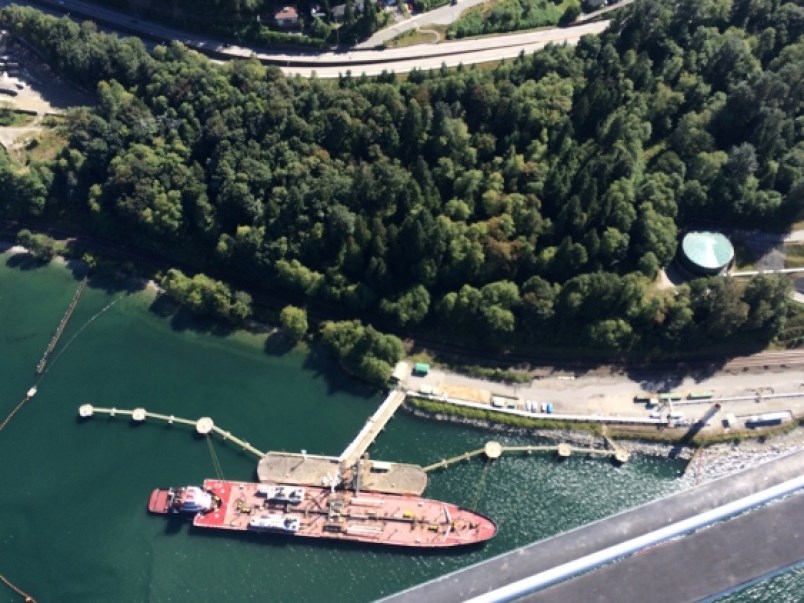The Kinder Morgan pipeline plan just cleared a major hurdle.
The National Energy Board is recommending the federal government approve the company’s plan to twin the Trans Mountain pipeline as long as 157 conditions are met.
The announcement came down Thursday afternoon, after more than two years of hearings and a record number of intervenors participating.
“The board is of the view that overall, with the implementation of Trans Mountain’s environmental protection procedures and mitigation, and the board’s recommended conditions, the project would not likely cause significant environment effects,” said Robert Steedman, the NEB’s chief environment officer in a pre-written statement read to media via teleconference from Calgary.
Steedman went on to note the board found “significant effects” in relation to increases in tanker traffic associated with the expansion. Tankers are expected to increase from five per month to 34. However, marine shipping is outside the NEB’s jurisdiction.
In the NEB’s 533-page report, the board stated the decision was a “difficult one” and noted that many of the benefits are national or regional, yet the burdens rest with local, regional and Aboriginal communities.
The board’s approval means the pipeline’s fate now rests with the Liberal cabinet, and the final decision will likely be announced in December.
The NEB’s main task was to determine whether the project was in Canada’s best interests. In justifying their decision, the NEB members listed their main reasons: That the pipeline increased access for Canadian oil, hundreds of long-term jobs and thousands in construction, development for Indigenous communities, benefits from spending on pipeline materials and considerable government revenue.
Burnaby North-Seymour Liberal MP Terry Beech said he was not surprised by the NEB’s recommendation and his role now is to make the riding’s concerns front and centre with the decision makers in Ottawa.
“When it comes down to this issue, I have a voice. All MPs have a voice. But I don’t have a veto,” he said. “I’m going work with all my stakeholders who live in the community and around the community and are impacted by this pipeline and encourage them to participate in this process wholeheartedly.”
Beech said he is planning a number of open forums and meetings with community groups in the coming months. He said that will be an opportunity for people who feel they weren’t heard during the process so far, acknowledging the NEB process was “inadequate and flawed”
“I will make sure to pass on our community’s views to my caucus, the cabinet, the prime minister and everyone else in Ottawa,” he said.
During the 2015 election campaign, Justin Trudeau said that “governments grant permits, communities grant permission,” Beech acknowledged. But he could not say whether that permission had been granted.
“I hesitate to answer that right now because I don’t want to pre-empt the seven-month process we’re about to undertake. Certainly looking at what was submitted on behalf of our relevant community members, the municipalities, the MLAs, the province, the local First Nations, and certainly the letters I’ve received in my inbox, I would have to say our local community has not granted that permission yet,” he said.
The announcement changes nothing for Rueben George, manager of the Tsleil-Waututh Nation’s Sacred Trust Initiative, which has been opposing the project since its onset.
“I’m not surprised. For us, it’s work as usual. We have a plan that we haven’t been shy about, sharing on how we feel about the project and what we’re doing to stop it,” he said.
The Tsleil-Waututh Nation is currently waiting on a ruling from the federal court, alleging the National Energy Board and federal government failed in their constitutional duty to consult the First Nation.
The Tsleil-Waututh produced their own 1,200-page assessment of the proposal and found “100 per cent” the pipeline would be a bad idea, George said.
“It’s clear and apparent that we have the best interest to protect the land and the water, which we’ve been doing historically for thousands of years. When we do this work, everybody benefits. Everybody,” he said.
The NEB’s approval may be a step towards pipeline approval, but it’s certainly not the last step, cautioned North Vancouver Liberal MP Jonathan Wilkinson.
“That’s the NEB’s approval, that’s not the government’s approval,” he said.
When asked about the challenges of meeting climate change goals should the pipeline be approved, Wilkinson stressed that any emissions would have to fall below Alberta’s cap.
“They’re not direct emissions because pipelines typically don’t leak,” he said.
If the project is approved, it will be because the government believes there is sufficient spill response in place, according to Wilkinson.
“We are Vancouverites, but we’re also British Columbians and we’re Canadians, so there has to be a national look at this as well as a local look at this,” he said, discussing the economic benefits of expansion.
When campaigning for office in 2015, Wilkinson told voters: “We as a country cannot say ‘no’ to everything.”
Describing her reaction as disappointed but not surprised, environmentalist and NOPE founder Janice Edmonds characterized the pipeline’s economic benefits as inflated.
“When you compare them to the risk of an oil spill and the billions of dollars that cleanup would cost and the cost to our economy in B.C. … the benefits that they’re talking about don’t stack up at all.”
Edmonds emphasized that there are still seven months to go to a final approval.
“We knew that right from the very beginning (the NEB) were going to approve it,” she said. “We haven’t lost yet.”
Discussing proposed public hearings on the pipeline, Edmonds had three words of advice for her fellow environmentalists: “Pack the hearings,” she said.



